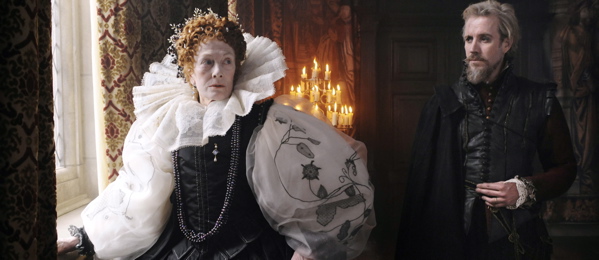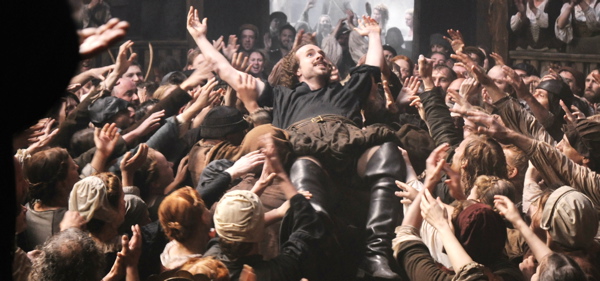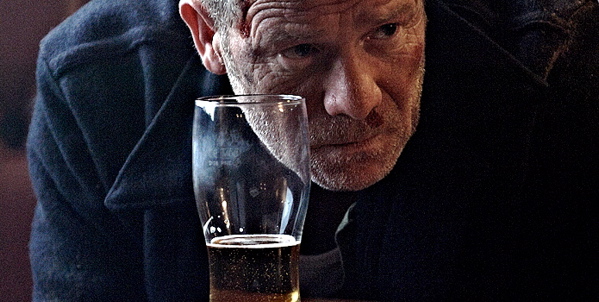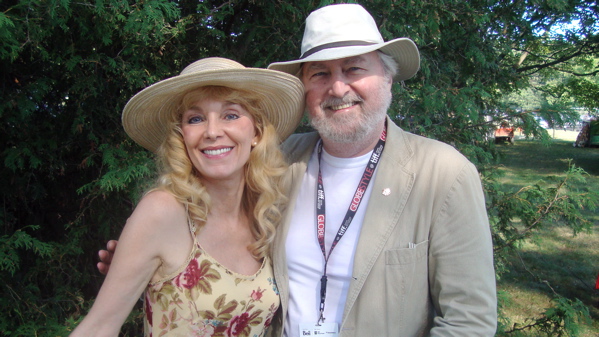By Ray Bennett
TORONTO – It’s curious that the lives of many creative men, e.g. Steve Jobs and Mark Zuckerberg, are so uninteresting, and in the case of William Shakespeare there is also a distinct lack of information. So you cannot blame Roland Emmerich for his choice to focus on the far richer and more interesting life of Edward de Vere, Earl of Oxford, in “Anonymous”, which Sony will release in the UK on Oct. 28.
The result is a thoroughly enjoyable “what if” movie and while the question of who wrote all those wonderful plays is central to the story and is exploited with sly wit, it’s really about the politics of the court of Elizabeth I.
Fans of C. J. Sansom’s Shardlake novels and Hilary Mantel’s “Wolf Hall” will relish the film’s depiction of the ferocious internecine chicanery of powerful figures that plot to decide who will succeed Elizabeth on the English throne.
It’s a sumptuous epic, with genuinely pleasing CGI images of 17th century London, and while the notion that someone other than the Bard of Avon wrote the best plays ever written adds to the film’s enjoyment, it’s the intrigue that enthrals.
Lovers of Shakespeare will delight in the many hints at who inspired notable characters in the plays attributed to him. The playwright is regarded generally as a P.R. man for the Tudors, and Emmerich posits that so too was De Vere. Historical facts and the dates of events are blurred to the service of the entertaining plot but like a Shakespeare play, the broad truth appears to be sound.
John Orloff’s screenplay covers the period at the end of the queen’s life with flashbacks to an earlier time. There are lovers and plotters, and questions of parentage, loyalty and betrayal are woven cleverly.
Vanessa Redgrave is energetic and powerful as the ageing monarch while her daughter Joely Richardson makes the younger queen both beautiful and cunning. Rhys Ifans gives his best performance yet as De Vere, an elegant and intense intellectual denied the opportunity to make public his brilliance, and Jamie Campbell Bower (Arthur in TV’s “Camelot”) makes the young Oxford full of life and bursting with ideas.
Sebastian Armestro is an earnest and likeable Ben Johnson while Rafe Spall is required to play Will as a bombastic, drunken and conniving opportunist. David Thewlis and Edward Hogg play the villainous Cecils, father and son, with great panache; Trystan Gravelle is appropriately oily as a Christopher Marlowe viewed as deeply flawed, and Sam Reid and Xavier Samuel are handsome and dashing as the Earls Essex and Southampton, whose plotting comes to a bad end.
Sebastian Krawinkel’s production design delivers a pleasing eyeful, Anna J. Foerster’s cinematography is suitably epic and so is the score by Thomas Wander and Harald Kloser.
The film is a departure from Emmerich’s sober-sided disaster pictures and he displays a flare for comedy as well as suspense and intense drama. It’s a lot of fun.
Venue: Toronto International Film Festival; Cast: Rhys Ifans, Vanessa Redgrave, Joely Richardson, David Thewlis, Xavier Samuel, Sebastian Armesto, Rafe Spall; Director: Roland Emmerich; Screenwriter: John Orloff; Producers: Roland Emmerich, Larry Franco, Robert Léger; Director of photography: Anna J. Foerster; Production designer: Sebastian Krawinkel; Music: Thomas Wander, Harald Kloser; Editor: Peter R. Adam; Costume designer: Lisy Christi; Executive producers: Volker Engel, Marc Weigert, John Orloff. Production: Anonymous Pictures Ltd; Distributor: Sony Pictures Releasing; UK rating 12, 130 minutes.












